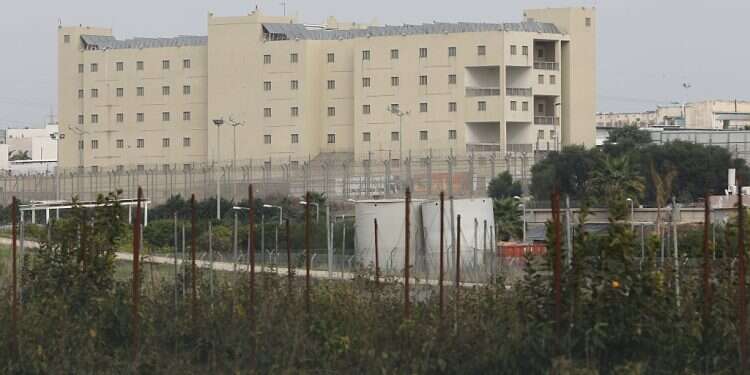Potential 'ticking timebombs' stay free because of prison overcapacity
The IDF has scaled back the practice of administrative detention after the Israel Prison Service said it could no longer handle the volume of detainees. "We have reached a situation in which when we look at the arrest list, we ultimately have to strike out names because there is no room in prison," official says.
Hanan Greenwood
Israel Hayom
Aug 25, 2023
 Israeli prisons are overwhelmed by incoming detainees. Pictured: the Hadarim Prison
Israeli prisons are overwhelmed by incoming detainees. Pictured: the Hadarim Prison
The IDF has had to recently forgo the arrest of wanted terrorist suspects in Judea and Samaria after the Israel Prison Service said it was in overcapacity, Israel Hayom has exclusively learned.
The IPS asked that the troops halt administrative detentions, a procedure that allows the arrest of terrorists who are considered "ticking bombs," namely, they get arrested using probable cause of a likely act in the making rather than because of a past attack.
In the wake of the surge of attacks over the past 18 months, the Central Command has shifted gears by stepping up the use of administrative detentions. Just over the past four days, the IDF, the Shin Bet security agency, and the Border Police have arrested more than 65 suspects, with raids being conducted on a brigade level in several areas in Judea and Samaria.
In 2021, some 450 administrative detentions were recorded, while in 2022 this spiked to 900 in the wake of the terrorist uptick. So far in 2023, more than 500 Palestinians have been arrested using this procedure.
But in light of the situation in Israeli prisons, this has slowed recently, and in light of the IPS request, this has resulted in arrests not being carried out in some cases. According to Israel Hayom's reporting, the IPS made several requests to end or lower the intensity of those arrests because they could not properly handle the inflow. As a result, the IDF heeded the request, despite this potentially allowing terrorists to continue plotting attacks that could threaten Israelis.
"We have reached a situation in which when we look at the arrest list, we ultimately have to strike out names because there is no room in prison. This is just mind-boggling. This has happened several times," a military official told Israel Hayom.
The lack of new prisons is one of the reasons IPS facilities are overcapacity, as is the longer incarcerations and the long periods detainees have to wait behind bars before they are put on trial. The situation has also resulted in prisoners being released early under administrative parole, including terrorists.
IPS officials have claimed that the number of terrorists being released is small and that they have already served almost all of the time. They have also noted that starting in September, administrative parole will no longer apply to terrorists even in cases where there is overcapacity.
As for the request made to the IDF, the IPS released the following statement: "The IPS is not involved in devising policy for various law enforcement agencies. The nationwide shortage in prison cells is impacted by many circumstances and that is why the IPS has been routinely engaged in the matter to solve this issue so that prisoners' and detainees' rights can be properly upheld. As part of that, the IPS commissioner has instructed that some 200 new places be vacated for new prisoners in areas that were previously meant for renovation."
No comments:
Post a Comment